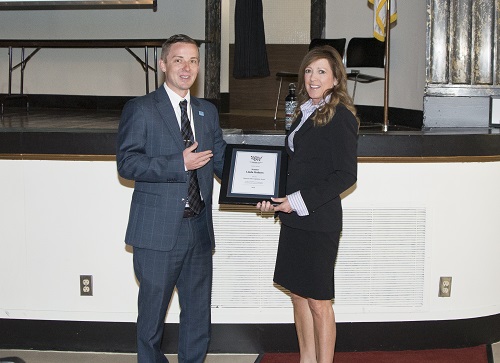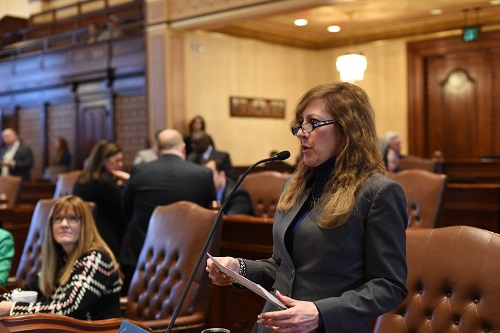
State Sen. Linda Holmes named Humane Society Legislator of the Year
- Details
- Category: Latest
SPRINGFIELD – For her efforts supporting and passing animal welfare bills, State Sen. Linda Holmes, D-Aurora, was awarded this year’s Humane Society Legislator of the Year Award.
“It is an honor to receive this award,” Holmes said. “I am a lifelong lover of animals, so when I became a senator it was second nature to support legislation that protects animals.”
The Legislator of the Year Award is given to the General Assembly member who best advocates for the wellbeing of animals. Sen. Holmes has sponsored numerous animal welfare bills throughout her career. This year, she is sponsoring measures to ban elephants from traveling exhibitions, control feral cat populations and create adoption plans for research animals, as well as several others.
“On behalf of our members, supporters and allies in Illinois, we are proud of the animal protection initiatives that Senator Holmes has championed in our state” Humane Society of the United States Illinois State Director Marc Ayers said. “She is a leader bringing both sides together to achieve amazing advances in our movement and continues to support our efforts to protect companion animals and wildlife, among other important animal welfare protections.”
The Humane Society of the United States is the nation’s largest animal protection organization. It provides hands-on care and services to more than 100,000 animals each year.

Senator Holmes joins Legislative Audit Commission
- Details
- Category: Latest
SPRINGFIELD – State Sen. Linda Holmes, D-Aurora, has joined the Illinois General Assembly’s commission to audit government activity.
“As a public servant, I have always sought to make our state’s government more transparent,” Holmes said. “On the Legislative Audit Commission, I get to work with Democrat and Republican colleagues from the Senate and the House to root out waste, fraud and abuse. I take this opportunity very seriously and I look forward to getting started.”
The Legislative Audit Commission is a bipartisan group of twelve legislators from the Illinois Senate and House of Representatives. The commission oversees audits of state agencies, holds public hearings and makes recommendations to the General Assembly on how to correct weaknesses.

Illinois rolls out ID cards to help people with disabilities
- Details
- Category: Uncategorised
SPRINGFIELD – Illinoisans with developmental, intellectual and mental disabilities can now apply for a special state ID card to help them navigate interactions with law enforcement thanks to legislation passed by Senator Linda Holmes (D-Aurora).
“The new ID cards give more information to law enforcement so that they don’t misinterpret certain behaviors as hostile or uncooperative,” Holmes said. “The cards will give people with disabilities and their loved ones peace of mind, knowing that their needs are being communicated to law enforcement. This idea was brought to our attention by a local parent whose child has autism, so the new ID cards are a response to an important demand from the community.”
In order to be issued a card, a person must have a disability such as autism, epilepsy, anxiety, bipolar disorder or schizophrenia. The cards can be given in addition to other state identification when requested by law enforcement.
“Fortunately, the Aurora Police Department and other law enforcement agencies in the 42nd district have already been proactive by training officers to have better interactions with people with disabilities,” Holmes said. “As more people begin to take advantage of these ID cards, first responders can develop and enrich their training programs.”
"This should be a great tool," Aurora police Lt. Mike Abbs said. "The more information we have on people's abilities and disabilities when we first encounter them, the better we can serve them."
The card lists identifying information and the following inscription: "My medical condition may impair my ability to communicate with others, especially with strangers or in stressful situations. Please do not interpret my behavior as refusal to cooperate."
Holmes urges area residents and their loved ones interested in being issued a person with a disability wallet card to apply for free at the Secretary of State’s office or contact her Aurora Office at (630) 801-8985.

Homes disappointed Rauner crew can't find cuts
- Details
- Category: News
SPRINGFIELD -- State Sen. Linda Holmes, D-Aurora, asked Illinois Department of Natural Resources Chief of Staff Brent Krebs why he and the department that he oversees remain optimistic about the passage of the grand bargain.
“You said that you are optimistic with the governor’s office and his budget people working on the grand bargain, which he has now blown up three or four times,” Holmes said. “With the governor’s budget being $4.6 billion out of balance, I want to know why you feel that this can be rectified without cuts to agencies such as yours, which have been pretty much decimated.”
Krebs responded that morale is still high in his department and that current budget woes have no effect on his optimism. “I maintain that an agreement can be reached,” Krebs said. “Without getting mired in the details of your negotiation, I’m convinced that we can get this thing done with some more negotiations.”
“I wish I shared your optimism,” Holmes said.
The bipartisan package of legislation known as the grand bargain was thrown off track last week when Gov. Rauner contacted Republican legislators and convinced them to vote against the package of interconnected proposals. Rauner’s move was a surprise to many, who pointed to the governor’s reliance on the framework’s revenue bills to close an almost $5 billion shortfall in his budget proposal and his public commentary praising the senate’s negotiations.
“I think you’re going to have to look at some cuts unless we get the governor to decide that he’s going to come up with revenue increases or even negotiate,” Holmes told Krebs. “At this point, Rome is burning. We need to do something.”
More Articles …
Page 68 of 82



